A Step to Make Safe Environment for Children
The tribal-dominated district of Malkhangiri, a conservative and reserved zone, is as affected and ridden by Child Rights violations. It was a preconceived and stereotype notion that the children are safe in Malkangiri area because of rich cultural and societal practices, but the veracity of the ground situation was exposed after CYSD started its Child centric programme intervention in the district and motivated the communities to raise and register such child rights violation cases with the appropriate authorities.
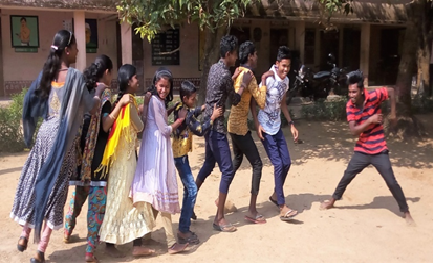 Within the two and half years of intervention, the programme team has observed that cases like illegal migration of children to other states, early marriage, sexual abuse/harassment, sexual exploitation and child labor are rampant in Malkangiri. As per National Family Health Survey (NFHS), Malkangiri district accounts for the highest rate of child marriages in the State where 39.3 percent of girls are married off before they attain the legal age of 18 years. Because of huge school dropouts & irregular education in the district, children and young girls are falling in the trap of marriage, migration, child labor, exploitation & sexual abuse. CYSD realized that these issues can only be tackled in a strategic manner, especially close coordination of the community, administration and civil society organizations. So the organisation started its intervention in 9 GPs under 3 blocks of Malkangiri by organizing children, youth and elders at the community level and established networking and coordination with district child protection unit as well as likeminded CSOs at the district level.
Within the two and half years of intervention, the programme team has observed that cases like illegal migration of children to other states, early marriage, sexual abuse/harassment, sexual exploitation and child labor are rampant in Malkangiri. As per National Family Health Survey (NFHS), Malkangiri district accounts for the highest rate of child marriages in the State where 39.3 percent of girls are married off before they attain the legal age of 18 years. Because of huge school dropouts & irregular education in the district, children and young girls are falling in the trap of marriage, migration, child labor, exploitation & sexual abuse. CYSD realized that these issues can only be tackled in a strategic manner, especially close coordination of the community, administration and civil society organizations. So the organisation started its intervention in 9 GPs under 3 blocks of Malkangiri by organizing children, youth and elders at the community level and established networking and coordination with district child protection unit as well as likeminded CSOs at the district level.
As a result of above intervention at grassroots level, the cases of child rights violation are being taken seriously by the administration. It has triggered motivation among members of Child Protection Committee at the Panchayat and Block levels, as a community driven effort, to deal the menace of child rights violation. At the same time, the organization has also built the capacity of child club, youth club, and adolescent girls club, traditional leaders of the village & SMCs of school on child rights / protection & available mechanisms. Because of taking a lead role for the cause of children in Malkangiri, CYSD became the member of different forums across the district like, Committee for Child Care Institution Monitoring, District Sponsorship & Foster Care Committee, and Committee against Child Marriage.
Simultaneously, the cases of child rights violation reflected increasingly in CYSD’s operational area either by the community or children registering the cases in ChildLine service, police station and child welfare committee for support service. Approximately, 10 cases per month have been registered at the above institutions for appropriate solution. Some successfully resolved cases are highlighted hereunder:
- In Mathili block, a girl child aged about 14 eloped with her classmate. As both were minor the case was informed to ChildLine by a member from adolescent group. The ChildLine team with the support of ICDS staff traced the eloped children & managed to bring them back home. Both were counseled by the ChildLine members & reached in a conclusion that both will restart their school and after attaining the legal age they might choose to marry. Now the children are in school and regular follow up counseling is taking place with the support from ICDS.
- A boy child (15 years) from Khairput block suddenly found dead in a nearby forest of his village. The investigation team found that on the day of death, the boy was called by his girlfriend (14 years) to that spot. The administation could conclude that it was honor killing. But to generate concrete evidence, the police took that girl child into custody without taking any legal steps enshrined in the POCSO Act. The matter was brought to the notice of ChildLine and which could release the girl. The case is yet to be resolved, but the girl child is kept under the custody of ChildLine service.
- A girl child (16 years) from Khairput block became pregnant when she was at a School hostel in Nabrangpur District. Knowing the health status of the girl, the teacher sent back her to home. After coming home she was feeling awkward and with suspicion the local AWW made the pregnancy test the girl and found positive. The matter was informed to CYSD frontline worker by a PLCPC member. It was decided to produce the girl child before the CWC for immediate support. The girl child was counseled for mental health support and she got convinced to stay in the ‘Shakhi Home’, a short stay home for 5 days. Then she was taken care by the medical team and completed all tests and immunization process. After getting order from CWC, the police investigated the case, arrested the boyfriend and sent him to the correctional home at Berhampur. Now the girl child is living with her parents. Meantime, the CWC has processed for victim compensation benefit to the girl. Also, the PLCPC has been lobbying with police to bring back the boy child from correctional home to negotiate and sort the matter.
These are some of the resolved cases for the children’s best interest, but still there are some challenges in the ground level and need further engagement towards policy level changes and sustainability. What will be the future of that pregnant girl child? Who will take care of her child, pre-natal & post-natal care? What about the societal and family acceptance? If she does not get any compensation from CWC than how will she manage her life? How to resolve the life threatening cases of those frontline workers. These are some emerging challenges still unresolved, however, CYSD has been constantly in process to do more study and research in this field to bring more child friendly rules and policies in place.

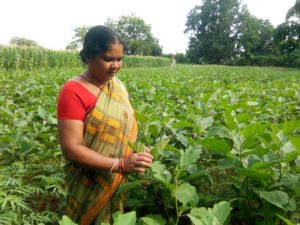 Kasturi lives in Bhairanibeda, a remote village in Khandabandha GP under Thakurmunda block of Mayurbhanj district with her husband, one son and one daughter. Her family was leading a miserable life in spite of having around 4.5 acres of cultivable land. Five years ago, both the husband and wife were doing daily labor and sometimes collecting Sal leaf to stitch plates, but the total income was hardly meeting their family needs. But, Kasturi had a special interest on vegetable cultivation from her childhood. After completion of 10th Standard education, she used to support her father and brother in vegetables cultivation.
Kasturi lives in Bhairanibeda, a remote village in Khandabandha GP under Thakurmunda block of Mayurbhanj district with her husband, one son and one daughter. Her family was leading a miserable life in spite of having around 4.5 acres of cultivable land. Five years ago, both the husband and wife were doing daily labor and sometimes collecting Sal leaf to stitch plates, but the total income was hardly meeting their family needs. But, Kasturi had a special interest on vegetable cultivation from her childhood. After completion of 10th Standard education, she used to support her father and brother in vegetables cultivation.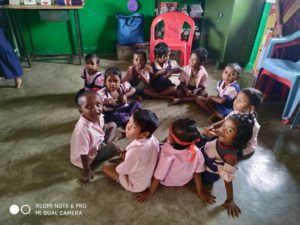 As part of Community monitoring, a village level interface was organized between the service providers and service users where Ward Member of that village was also present. During a plan of action to smoothen the service of Anganwadi Centre, the Anganwadi Worker explained about the difficulties she is passing through in providing the services. However, in the same meeting it was decided by the service users that the mothers will take the issue forward, and the ward member was very enthusiastic to help them out in this regard. Within a week the ward member wrote an application and the mother participants endorsed to take it up to the appropriate authority. Then they submitted the application to the CDPO and BDO of Boipariguda block and continuously made follow up and negotiated with them to sanction a new Anganwadi Center.
As part of Community monitoring, a village level interface was organized between the service providers and service users where Ward Member of that village was also present. During a plan of action to smoothen the service of Anganwadi Centre, the Anganwadi Worker explained about the difficulties she is passing through in providing the services. However, in the same meeting it was decided by the service users that the mothers will take the issue forward, and the ward member was very enthusiastic to help them out in this regard. Within a week the ward member wrote an application and the mother participants endorsed to take it up to the appropriate authority. Then they submitted the application to the CDPO and BDO of Boipariguda block and continuously made follow up and negotiated with them to sanction a new Anganwadi Center.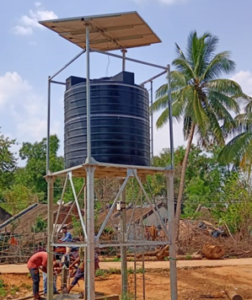 Rounds of combined meetings of CYSD team, VWSC and youth group were conducted to arrange resources for bringing a tangible solution to the above issue. The VWSC members and youth group were facilitated to write an application to the Block Development Officer (BDO) through J.E, RWSS for installation of a solarised pump set in the community, thinking the administration would sort out their problem. The VWSC members regularly made follow up with the block administration for the same. Within a short period of time the construction work was started by youth group of the village, with due approval and financial sanction from the concerned BDO for installation of solarised pump-set in the village.
Rounds of combined meetings of CYSD team, VWSC and youth group were conducted to arrange resources for bringing a tangible solution to the above issue. The VWSC members and youth group were facilitated to write an application to the Block Development Officer (BDO) through J.E, RWSS for installation of a solarised pump set in the community, thinking the administration would sort out their problem. The VWSC members regularly made follow up with the block administration for the same. Within a short period of time the construction work was started by youth group of the village, with due approval and financial sanction from the concerned BDO for installation of solarised pump-set in the village.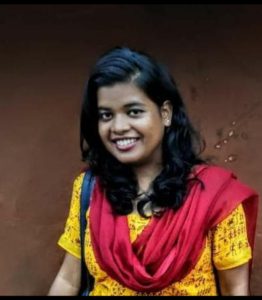 Stitha Prajna, a girl from a normal middle class family of Jagatsinghpur district completed her graduation in Agricultural Engineering from OUAT and later Agribusiness Management also. Like all other girls she was also in search of a suitable job and was looking for the opportunities. After some days she also managed to find a kind of work for herself which was suited her skill base i.e. agriculture.
Stitha Prajna, a girl from a normal middle class family of Jagatsinghpur district completed her graduation in Agricultural Engineering from OUAT and later Agribusiness Management also. Like all other girls she was also in search of a suitable job and was looking for the opportunities. After some days she also managed to find a kind of work for herself which was suited her skill base i.e. agriculture.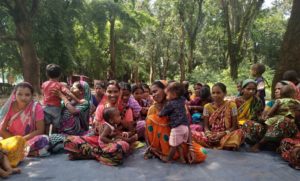 As part of the community monitoring process, an interaction was carried out between the service users and service providers to open up the services provided for maternal and child health, supplementary nutrition along with pre-school education. During the interaction with the service users, especially pregnant women and lactating mothers, it was came out that, the Anganwadi Worker neither attends AWC nor is involved in any kind of pre-school activity. The AWW confessed that she attends the AWC at irregular intervals as she remains busy in other official works and traveling to different places, like sector office, block office and doing personal household chores. The mothers of pre-school children voiced out their concerns regarding their children are being deprived of the pre-school activities, like singing, oration, drawing and playing which ensure children’s cognitive development in the first five years of their life.
As part of the community monitoring process, an interaction was carried out between the service users and service providers to open up the services provided for maternal and child health, supplementary nutrition along with pre-school education. During the interaction with the service users, especially pregnant women and lactating mothers, it was came out that, the Anganwadi Worker neither attends AWC nor is involved in any kind of pre-school activity. The AWW confessed that she attends the AWC at irregular intervals as she remains busy in other official works and traveling to different places, like sector office, block office and doing personal household chores. The mothers of pre-school children voiced out their concerns regarding their children are being deprived of the pre-school activities, like singing, oration, drawing and playing which ensure children’s cognitive development in the first five years of their life.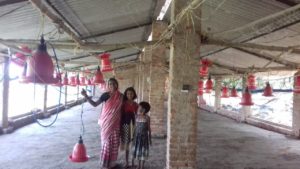 Managing a 7-membered family with the meagre income was quite difficult. There was no alternative source of income except the backyard farming. In the year 2011, with the initiative of CYSD’s Child Development Project, in Sialijoda village a Self-Help Group, namely ‘Om Shanti’ was formed consisting of 12 women and Rajani was fortunate to become a member of the group. From very beginning Rajani was a sincere member of the group. Due to her educational back ground, she was liked by all the members. Her active and regular participation in all the meetings of SHG helped her to improve the knowledge base.
Managing a 7-membered family with the meagre income was quite difficult. There was no alternative source of income except the backyard farming. In the year 2011, with the initiative of CYSD’s Child Development Project, in Sialijoda village a Self-Help Group, namely ‘Om Shanti’ was formed consisting of 12 women and Rajani was fortunate to become a member of the group. From very beginning Rajani was a sincere member of the group. Due to her educational back ground, she was liked by all the members. Her active and regular participation in all the meetings of SHG helped her to improve the knowledge base.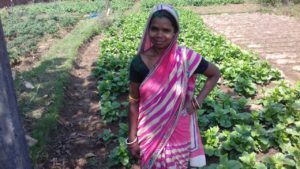 Rajani’s hard struggle for existence has come to an end. She has been supplementing to her husband’s income to a great extent. Her sincere effort made the poultry farm a stable one of worth 2 lakhs rupees. With the profit amount, she has built up a pucca shed for chick rearing with cost of about Rs. 5.0 lakh and has dug a small pond of 30 cent of land for duck rearing. Besides, she has developed a horticulture garden, exclusively cashew plantation in 2 acres of land from which she fetches Rs. 80,000 annually.
Rajani’s hard struggle for existence has come to an end. She has been supplementing to her husband’s income to a great extent. Her sincere effort made the poultry farm a stable one of worth 2 lakhs rupees. With the profit amount, she has built up a pucca shed for chick rearing with cost of about Rs. 5.0 lakh and has dug a small pond of 30 cent of land for duck rearing. Besides, she has developed a horticulture garden, exclusively cashew plantation in 2 acres of land from which she fetches Rs. 80,000 annually.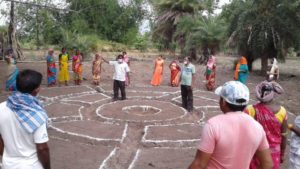
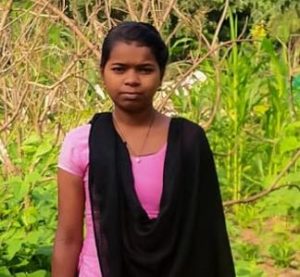 Here is a real life example of an adolescent girl, Rasmita Pangi, age-17 of Siripeta colony of Parkanmala GP. Being an active member of the village Adolescent Group she has motivated people in her vicinity to work on kitchen garden and cultivate the crops and plants having dual objectives – to earn money and have nutritious vegetables to deal with anaemic of her neighbouring brothers and sisters. “I know very well that it is a hard task for a father to look after a 10-members family from agriculture based income. I am hopeful, the nutritional garden can bring change in their life and livelihoods”, says Rasmita.
Here is a real life example of an adolescent girl, Rasmita Pangi, age-17 of Siripeta colony of Parkanmala GP. Being an active member of the village Adolescent Group she has motivated people in her vicinity to work on kitchen garden and cultivate the crops and plants having dual objectives – to earn money and have nutritious vegetables to deal with anaemic of her neighbouring brothers and sisters. “I know very well that it is a hard task for a father to look after a 10-members family from agriculture based income. I am hopeful, the nutritional garden can bring change in their life and livelihoods”, says Rasmita.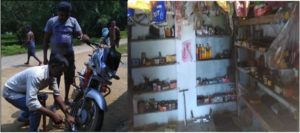 Immediately post – training, Bharat opted to open an automobile workshop in his own house. However, owing to financial deficit of buying the spare parts and other accessories of repairing, his mother, a member of Padmalaya SHG, Gojapathar helped him a lot. His mother applied for a loan of Rs10,000 from the SHG and repaid the amount in installments as soon as Bharat started earning from the garage. Now, on average he earns Rs.400 per daily. In order to make little additions to his income, he also runs a vehicle repairing shop in Damahuda weekly market. Usually the customers of nearby 7 villages of Damahuda Panchayat come to him. He renders services, like puncture repairing, tyre pressure checking, spark plug cleaning, greasing, servicing, etc. for bikes as well as bicycles.
Immediately post – training, Bharat opted to open an automobile workshop in his own house. However, owing to financial deficit of buying the spare parts and other accessories of repairing, his mother, a member of Padmalaya SHG, Gojapathar helped him a lot. His mother applied for a loan of Rs10,000 from the SHG and repaid the amount in installments as soon as Bharat started earning from the garage. Now, on average he earns Rs.400 per daily. In order to make little additions to his income, he also runs a vehicle repairing shop in Damahuda weekly market. Usually the customers of nearby 7 villages of Damahuda Panchayat come to him. He renders services, like puncture repairing, tyre pressure checking, spark plug cleaning, greasing, servicing, etc. for bikes as well as bicycles.